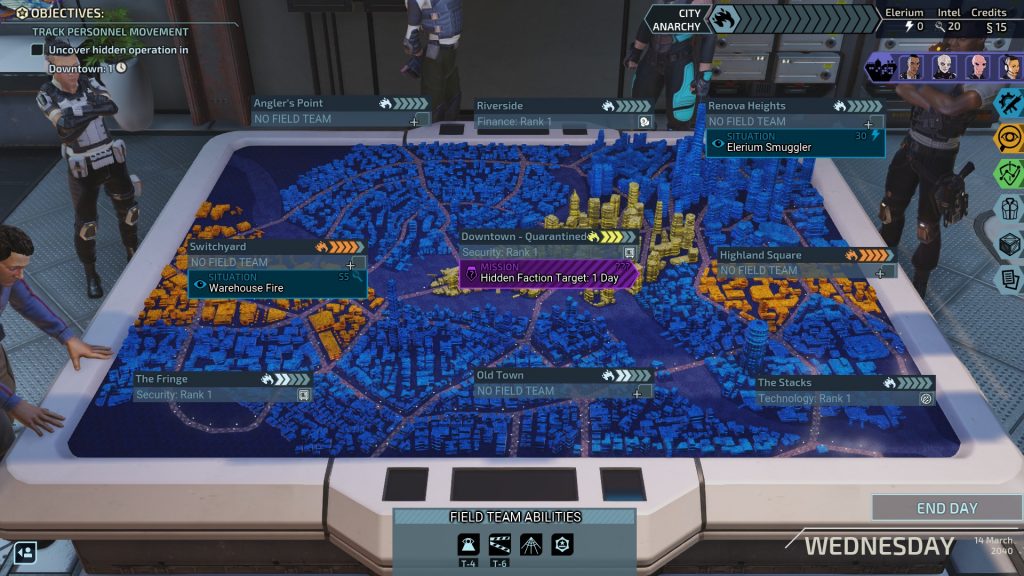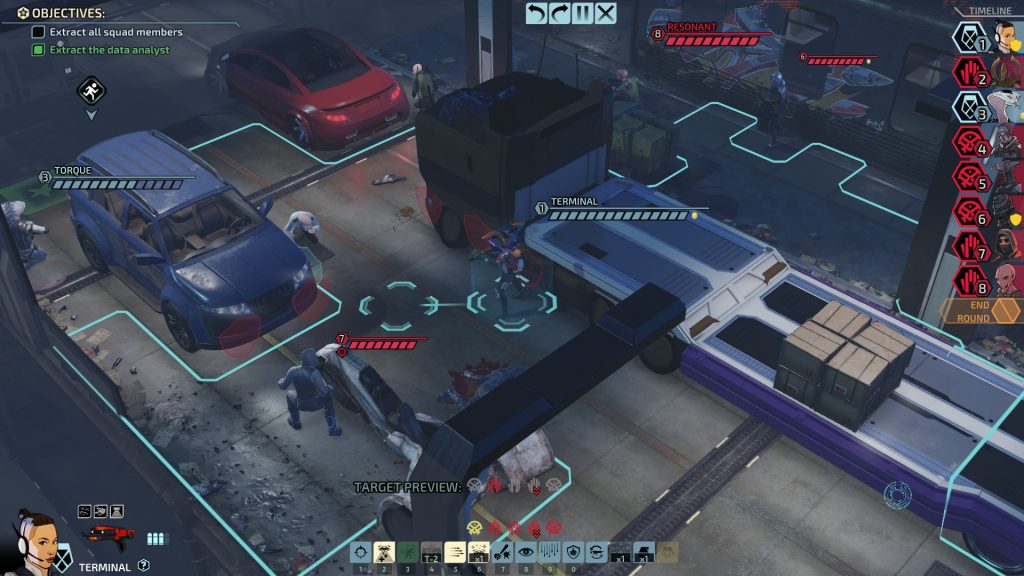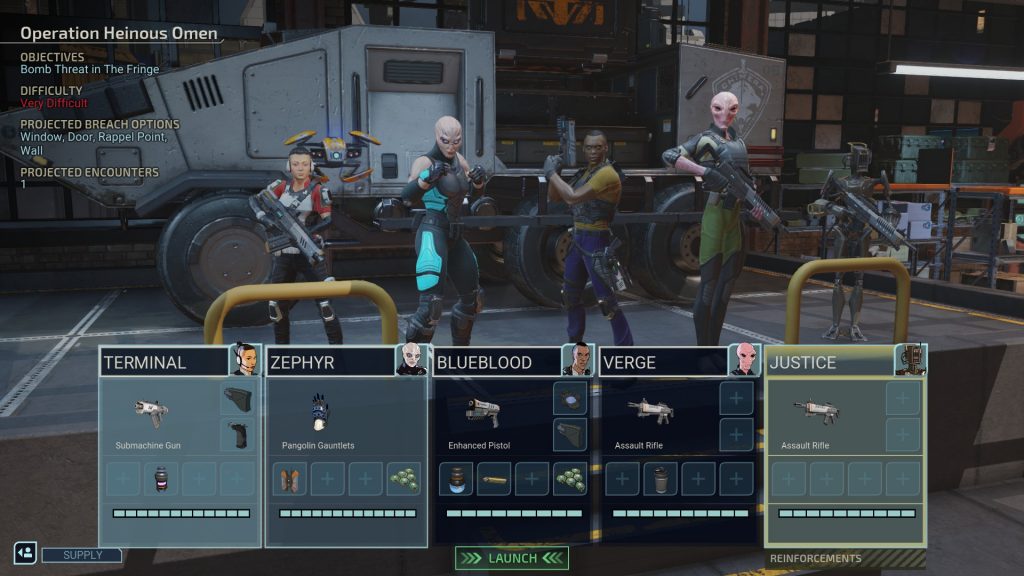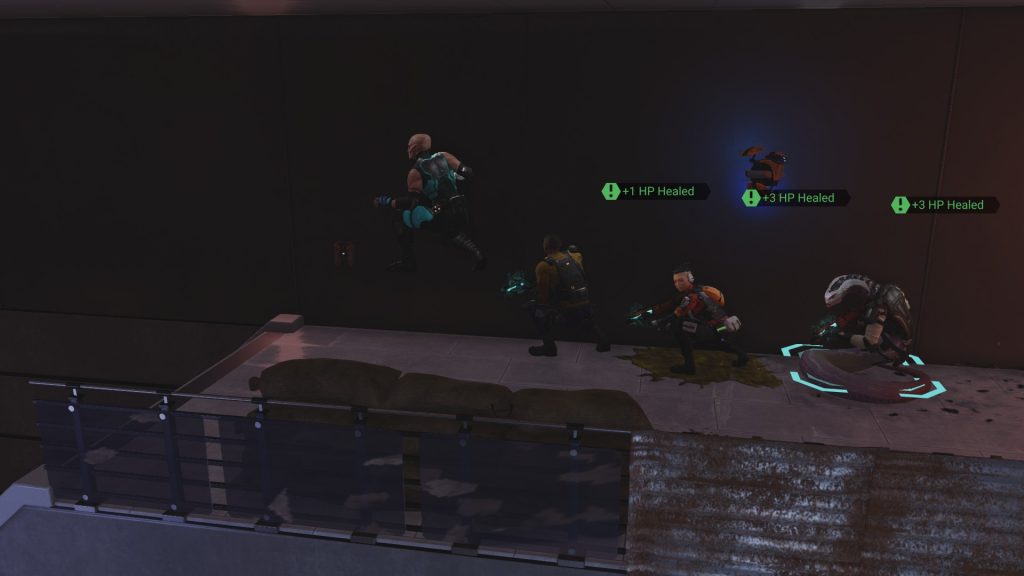I couldn’t imagine the trajectory the X-Com franchise has taken over the last 30 years and most recently with Firaxis’ take. And now, here we are at XCOM Chimera Squad, billed as both a budget release and a standalone game in the XCOM universe. Depending on your thoughts on the franchise, this is either a bold new direction or a complete teardown of the design. Regardless, Chimera Squad gives us a new take at broadening Firaxis’ tactical gameplay.
Neon Lights
For those used to the grim and dark motif of the previous XCOMs, Chimera Squad shines a bright neon light on City 31. It’s been five years since the end of XCOM 2, and the remaining aliens, hybrids, and humans have formed a peaceful city. When a terrorist attack claims the mayor, it’s up to XCOM’s new peacekeeping force Chimera Squad to step in and keep the city from descending into chaos.
Right off the bat, this is not your previous XCOM games. Chimera squad is full of unique individuals made up of the as-for-mentioned groups. Each character has set weapons, skills, and personality. In the first hour of play, there is more dialogue said than in any of the previous X-COM games combined. The overall structure of the game is a squared down version of the XCOM formula.
Taking it to the Streets
You’re not fighting over a geoscape in Chimera Squad, but the entirety of City 31. Your mission is to root out who killed the mayor by taking on the three gangs in charge. Each gang plays out as a mini campaign where you’ll decide what missions to go after on a day by day basis. You need to monitor the unrest that builds up in the areas that you’re not focusing on, and the game’s fail state is if the unrest reaches max. You are free to tackle the gangs in any order, but the gangs you save for later will be harder.
The basics of XCOM 2 are here, as you can spend resources to acquire items, research new tech, and outfit your characters.
Where things begin to take a different turn is that your character pool is locked to the 11 unique members of Chimera squad (and only 8 can show up during a playthrough). You can only take four characters out on a mission, but the other ones can be used back at base on secondary missions, training, and more.
Once you get to a mission, this is where Chimera Squad breaks away from Firaxis’s previous entries.
Breach and Clear
Chimera Squad is not a resistance group or a stealth outfit, but a police force that must breach targets. Missions are broken down into one or more encounters where the team will breach and move in to take out the offenders. For each encounter, you’ll choose where to breach and what members of your squad will enter at each point. The different breach points come with buffs or debuffs that can affect the upcoming encounters.
Where things truly get away from XCOM 2 is with how combat plays out. XCOM for the entirety of its legacy has always gone with a team vs. team system where each side does all its actions before the other team goes. Chimera Squad makes use of a turn order which alternates between your characters and the enemy.
In turn, this changes the dynamic of combat and the options you have available. With previous games, combat centered on bursting down enemies in order to reduce the number of actions they could do against you.
With Chimera Squad, it’s now more important to mitigate threats and do what you can to upset the turn order. Disabling or killing the next character to go gives you the ability to essentially act twice. With each character having unique abilities, it adds more weight to each action. While Chimera Squad is essentially made up of the class powers and designs featured in XCOM 2, they’re all tweaked to provide different takes on it. Two melee-focused characters: Zephyr and Axiom handle completely different from one another in their utility.
As characters rank up, they gain access to new abilities, including options that can occur on each breach attempt.
There are also special team-up options that allow characters to work together and affect the timeline in terms of actions. On missions where you must evac or protect a target, giving them one free action can mean all the difference.
Adding difficulty to the game is the fact that all characters must survive missions, and you will fail if someone bleeds out.
XCOM purists will most likely balk at these changes, and it takes us to our point for this piece: Does Chimera Squad work as an XCOM title?
Com vs Com
Let’s make things clear — Chimera Squad was never pitched to be XCOM 3, but as more of a side story in the universe.
XCOM’s deep core gameplay loop and progression are not present in Chimera Squad. You’re not running a worldwide organization, but managing 11 different characters and a police station. What’s odd about Chimera Squad is how it takes the focus and philosophy of XCOM and reverses it.
XCOM has always been a long war (no pun intended) kind of experience. It’s okay to lose a battle as long as you are making long-term progress. Chimera Squad is about the immediate future: what am I doing for each action during rounds? While there is some progression, it’s nowhere near as intricate or deep as the main XCOM games. You will still be getting upgrades and new gear, but the overall power levels don’t get as high as XCOM 2 did.
However, the more intimate combat solutions combined with the character powers make the tactical layer more interesting to me than in XCOM. I’ve spoken at length about XCOM and XCOM 2’s combat and how the baseline experience was too sterile and black and white for me.
By giving each character a few powers right at the start, it opens the utility a lot earlier than XCOM 2. One of my favorite changes is that every character gets a subdue ability: a low-cost guarantee to hit melee attack to knock perps out. Combined with the smaller map sizes, combat is a lot faster without sacrificing the risks of fighting.
In turn, Chimera Squad feels more tactical compared to the early game of XCOM 2. If you play Chimera Squad like XCOM 2, you are not going to get far. As you play further into it, the generic actions that made up XCOM 2 like overwatching, or even just shooting, aren’t the best plays anymore. You want to use attacks and items that mess with the enemy or moves that give your team a greater advantage. XCOM 2 maps could take 30+ minutes of high stakes choices to get through them, while Chimera maps are often done in 10-20 minutes outside of the three encounter missions.
With that said, the encounters in Chimera Squad aren’t as interesting or varied compared to XCOM 2.
Each one of the three campaigns have you going up against a few generic enemy types and faction-specific ones. You will see all the possible enemies way before you are done the campaign. The only missions that prove to be the hardest are ones where the enemies can get infinite waves of reinforcements; forcing you to rush to the escape, and the “boss” stages that occur at the end of each investigation.
As mentioned, the order in which you do the three campaigns will affect “dark events” that make the factions more dangerous, but your overall objective will remain the same. The main thing that will affect your play of the game is deciding which squad members to bring in and who to make your primary force. There are no randomly generated maps from what I could see. Missions all take place on hand-made maps, with mission-critical levels 100% fixed each time.
This also begins to hurt the breach system the further you play. Given the fixed maps, there isn’t a lot of choice in terms of picking what areas to go through.
Failed Ops:
Chimera Squad has been described by fans as “Budget XCOM or XCOM Lite” and it does show both in gameplay and technical issues.
Just like in regular XCOM, you can have situations where teammates or mission objectives are taken out and there’s nothing you can do about it. However, unlike XCOM, you cannot fail any mission. I would not recommend a hardcore or ironman run of this game as your first play to avoid major frustration. The as-for-mentioned rescue/escape missions can become a nightmare when reinforcements can swarm an area and completely mess with the turn order.
Due to the limited nature of the campaign and progress, the game does begin to drag on. If you play right, you’re going to have all the upgrades and a maxed-out team long before the end of the campaign. I felt hard difficulty was a good baseline for playing Chimera Squad if you’re familiar with the basics of XCOM.
I, as well as friends, ran into numerous technical issues. From the camera zooming into a model’s head to the UI not working properly and more. The game could also do a better job of indicating what actions will use up a turn once you start combining skills and items found. There didn’t seem to be a way to examine enemies like in XCOM 2 to see their stats and abilities. Now, the game really doesn’t like reloading saves during a mission, with attack effects and turn order getting altered when reloading.
Lastly, the balance seems to be all over the place in Chimera Squad. The utility of items and specific agent upgrades varies greatly.
Several ultimate skills don’t serve a useful purpose and the ones that do can only be used once per mission. Some agents like Torque, Terminal, and Verge, are always useful. Other ones like Shelter and Patchwork are more specialized. The problem is that the game needs to provide more information on missions, as bringing the right counter can make all the difference at the higher difficulties.
The game was clearly designed that each faction counters a specific tactic, or is built around one. In theory, you are supposed to properly equip your team and bring the right counters, but there’s no way a new player is going to have that knowledge going in. You are going to be at the mercy of RNG when it comes to the scavenger giving out rare equipment and items. Even the faction-specific items that are supposed to be the best gear in the game are questionable in their use. Getting the reflex grip that allows characters to not end their turn after firing for the first action is so huge that it borders on game breaking.
Coming Home
XCOM Chimera Squad may not be the XCOM 3 we were all waiting for, but it does show Firaxis’ willingness to experiment with their formula. I hope we do see more improvements and changes to the tactical layer, while keeping the greater sense of persistence and challenge from the main game.
Chimera Squad is not going to work for you if you are a fan of the persistence over the tactical layer of the main game, but it does present a less overwhelming take on XCOM’s gameplay. If Firaxis can fix the bugs and release a balance patch, this could become the best first step for someone to get into the XCOM series. I’m also hoping that modding tools and support are also released, as the XCOM modding community has been huge for the success and longevity of these titles.
If you enjoyed my post, consider joining the Game-Wisdom discord channel open to everyone.





